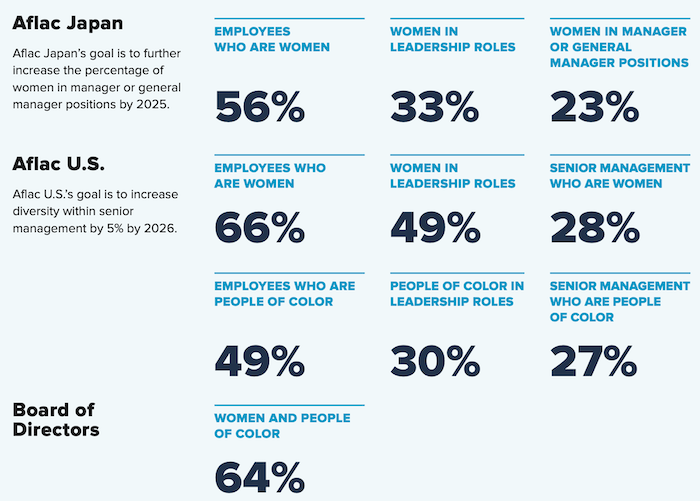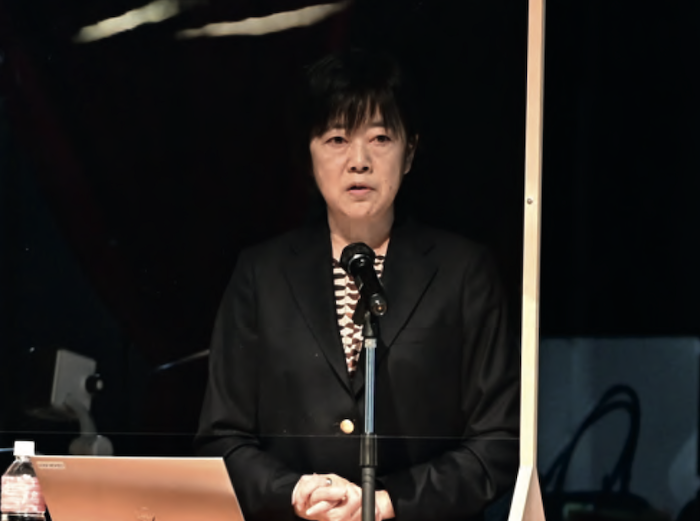SOURCE: Aflac Incorporated
DESCRIPTION:
Our Workforce Diversity
In 2001, Aflac Chairman and CEO, Dan Amos, led the cause to create the first Diversity Council at Aflac. Though time has passed, our commitment to diversity continues to this day with over nine employee-led councils globally.
Diversity, equity and inclusion (DEI) has continued to be a key theme in the Aflac culture and is critical to our human capital strategy. In the aftermath of 2020, we encountered various societal challenges and to help us navigate those challenges, we developed a social justice committee aimed at supporting various social causes through corporate donations, representation in governmental affairs, and employee action in our communities. However, 2021 continued to be an area challenged in the social and political arena. It is during times like this that we lean on each other and recognize that we are stronger together. So in 2021, we expanded our DEI strategy and launched a global investments strategy that supports minority partners and identifies investments that drive DEI and support social justice, with 74% of our donations impacting underserved populations to include communities of color.
Our employees are the bedrock of our company and we greatly benefit from their diverse backgrounds, experiences and ideas. Ongoing efforts to advance fair representation in the workplace continued to drive positive change as we implemented mechanisms to better measure the representation of women and people of color in leadership at all levels. Recognizing that diversity and inclusion is a business imperative. In 2021, Aflac committed to employee (leadership) diversity goals with accountability.
At the highest levels of Aflac’s leadership and throughout our organization, we are committed to fostering a diverse and inclusive workforce, just as we have for decades. Fostering diversity isn’t only the right approach to take; it also makes good business sense. In order to accomplish our goals and serve the communities where we have a presence, we must surround ourselves with people who bring different perspectives to the table.
Our workforce represents the communities we serve
Aflac is also mindful of the communities in which we operate, striving to be reflective of their diversity and actively working to mirror it. We recognize that our success is often defined by what we do each and every day when others aren’t looking. It’s how we treat all people. It’s the opportunity we give to all people. It’s about how we embrace diversity and encourage dialogue and inclusiveness. We are committed to doing even better and to continuing to make a difference.
Over the years, we have brought this same inclusive spirit to Japan where we have boosted our diversity promotion efforts by increasing the number of women in leadership positions.
At Aflac, our commitment goes beyond talking about diversity to actions that foster equity and inclusion. It is reflected in the makeup of our workforce, the equity of our pay policies and the initiatives we continually undertake to make every person feel welcomed and valued. There is no doubt that we are building a stronger company, but we recognize there is more that we can do. Still, we believe we are on the right path.
The company’s corporate culture reflects its commitment to diversity and inclusion at all levels of the company. For example, at the end of 2021:

Aflac Heartful Services Co., Ltd.
- Established in 2009, Aflac Heartful Services Co., Ltd. (Aflac Heartful Services), a subsidiary of Aflac Japan, promotes the hiring of employees with disabilities.
- Aflac Heartful Services has established a barrier-free work environment and provides, among other things, specialized training, specially trained supervisors and development opportunities to support those with disabilities.
- Of Aflac Heartful Services’ 145 employees as of December 31, 2021, 116 have a disability.
- Aflac Heartful Services supports these employees with the assistance of advisors for long-term career support.
Diversity Council
- Both Aflac Japan and Aflac U.S. have created diversity councils that include employees from various levels that meet regularly to discuss activities and initiatives.
- The councils are designed to create avenues in which people can communicate and appreciate one another’s differences.
U.S. Employee Demographics
NEW HIRES
- 76% women
- 64% people of color
At Aflac, we know that DEI goes beyond EEO-1, which is a U.S. requirement. Nonetheless, we know that many investors want to see this data. In the spirit of the transparency, we at Aflac Incorporated are making the most recent report available. We expect to continue posting future reports in the same way after filing with U.S. Department of Labor.
- The pay data is collected from all Aflac U.S. employees and does not include global information.
- The job categories in the EEO-1 report are not reflective of our workforce or compensation system. EEO-1 job groups encompass a broad range of grade levels, job titles, technical and non-technical jobs. For reference, executive/senior officials and managers coordinates most closely to Aflac’s definition of senior management. First/Mid officials and managers coordinates most closely with Aflac’s people leaders; professional coordinates most closely with individual contributors; Technicians coordinate most closely to hourly workers; sales workers coordinate most closely with Aflac’s sales force; administrative support coordinate most closely with specialist; craft workers coordinate most closely with facilities consultants.
- Aflac is committed to global pay equity and uses ongoing analysis to ensure fair pay irrespective of gender or race/ethnicity. We will continue to perform pay equity assessments moving forward and close any identified gaps. Pay equity is defined as the average pay gap between employees of different genders or races/ ethnicities in the same or similar roles after accounting for legitimate business factors that can explain differences in pay such as location, time at grade level, tenure, education, experience, among other considerations.
- In 2021, 375 job titles held by both men and women at Aflac U.S. were reviewed, accounting for 3,675 employees. Among those positions, the salary ratio (compensation for women relative to men) was at par: 99.5%.
To learn more about the EEO-1 Report for Aflac U.S., click here.
Aflac Japan Pay Equity
Aflac Japan reformed its human capital management system; starting in 2021, a new system for management was introduced and from 2022, a new system for general employees was established. Under the new system, jobs are assigned specific grades according to the respective position duties and responsibilities. Factors such as gender, age and race are not used in determining a job grade, and every job provides an equal opportunity for all employees. Aflac Japan’s total reward system provides competitive market-based compensation to acquire and retain talent. Aflac Japan’s Human Capital Management Policy Committee, which is led by the Aflac Japan president and consists of senior management, conducts annual monitoring of the Human Capital Management system for equity and fairness and evaluates job grades and compensation for consistency and adequacy.

Developing an inclusive workforce
Through its Women’s Empowerment Program, Aflac Japan surpassed its goal of reaching 30% of women in leadership positions in 2020 (assistant manager or higher) one year ahead of schedule, and more progress is being made. Aflac Japan has now raised the bar and is on pace for a new target of 30% of manager or general manager positions to be filled by women by the end of 2025 and has achieved our target of 23% by the end of 2021 on schedule.
In Aflac U.S., there are a variety of offerings for women to grow in their development and careers. High potential senior level female leaders are selected to attend prestigious development programs in their specific fields or in general leadership. Along with this, specific functional areas have created development programs designed to build the pipeline of female leadership deeper in the organization.
Diversity Councils
In both the U.S. and Japan, we have created diversity councils that include employees from various levels that meet each quarter to discuss activities and initiatives. The councils are designed to create avenues in which people can communicate and appreciate one another’s differences.
Download the 2021 Aflac Business & Sustainability Report here
KEYWORDS: NYSE: AFL, Aflac, 2022 Aflac Business & Sustainability Report, diversity, equal pay, workforce diversity


